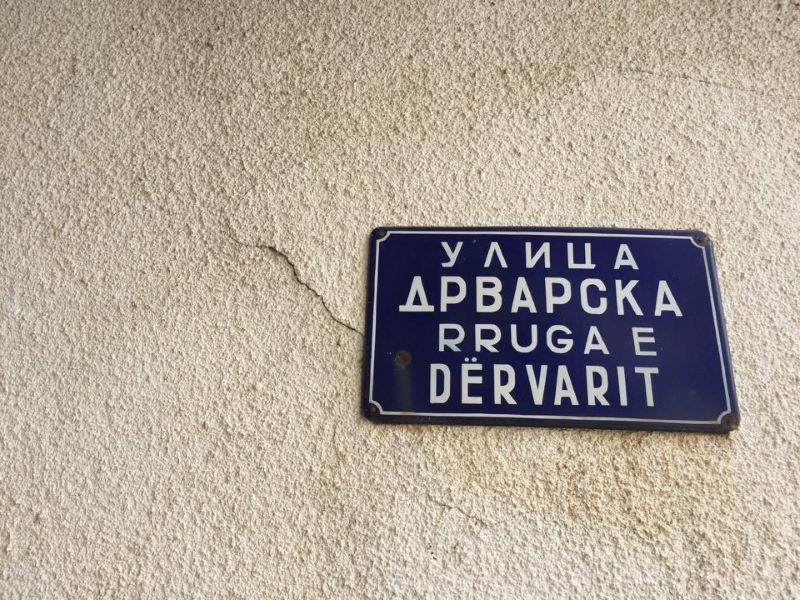Category: News Organizations: UNMIK , IOM Tags:
September 2019, on the European Language Day, a digital Serbian-Albanian dictionary was presented in Pristina. It has 20,000 words at the moment and the plan is for it to have 50,000 to 60,000 words by June 2021. This dictionary is the result of a collaboration between the Office of the Commissioner for Languages, NGO "Center for Social Initiatives", the International Organization for Migration (IOM) and the United Nations Mission in Kosovo (UNMIK). We have tried to find out whom the dictionary is intended for, whether it will make a move regarding the compliance with the Law on Official Languages in Kosovo and how certain it is for Serbian and Albanian languages to become part of formal education. "It has been almost three decades since the last Serbian-Albanian dictionary of this size. Convinced that the language barrier is not only spoken but also a mental barrier to understanding among people in Kosovo, we have decided to provide them with what official policies had not provided: an easily accessible, high-quality and easy-to-use dictionary of words and expressions that they hear every day in their surroundings." explains Veljko Samardžić of the organization "Center for Social Initiatives", which worked on the development of the dictionary. The need for dictionary development was also recognized in the research conducted during 2014 and 2015 by the Office of the Commissioner for Languages. The dictionary is primarily intended for translation officers, but also other interested actors. "I think this dictionary is, in a way, already part of the academic community. The authors who work on the dictionary are eminent professors from Pristina and Belgrade and experts in lexicography, so I believe that this is the best way for the academic community to be involved in this whole process. This will help promote the dictionary itself among experts,” says Slaviša Mladenović, Commissioner for Languages. "We should look forward to the diversity of society" Dhurata Prokshi is a translator in a court in North Mitrovica and is also a teacher of Serbian and Albanian. She believes that the dictionary should be used by all those who deal with languages, especially in institutions. She points out the necessity of compliance with the Law on Official Languages and recalls that there are numerous difficulties that translators face in the workplace. In her opinion, it is important that citizens receive answers in their own language when addressing institutions. “It is necessary to increase the number of experts within institutions that are basic or have more contacts with citizens. Secondly, investments should be made in expanding human resources, so that translators who are already working and those who have some knowledge and willingness to get involved in institutions, have the opportunity to do so,” explains Dhurata Prokshi. "However, jobs related to languages and translation are something that should not only be understood within the scope of technical assistance, but should be constantly invested in. Language is not just one form, especially it is determined by the topic within which to translate or work on,” says Prokshi. She points out the benefits of knowing both languages: "When you know both languages, you have easier access to all the services you need. You can gain some cooperation that was not possible with the knowledge of only one of these languages, which are official in Kosovo. I think it could also have a big impact on interpersonal relationships, if we understood each other's languages. It needs to be done at a slightly better level, not just to change the packaging but work on changing the core, for people to understand that language is something that is part of an identity, something that we as 21st century citizens should respect and look forward to the diversity of our society, all this while respecting languages." Learning Albanian or Serbian in schools is still a taboo. It is unlikely that this will happen in the near future. There are two educational systems operating in Kosovo, one under the laws of Kosovo, the other under the laws of Serbia, each not recognized by the other. "We haven't been learning the languages of our neighbors for thirty years, and this is an unfortunate anniversary," Samardžić says. Neither Mladenović is optimistic about introducing Serbian and Albanian into formal education: "Everyone cites more difficulties in the process than the benefits that the process could bring. There are many voices claiming that the time is not right for that. However, I believe that it is an absolute imperative that something like that happens and that it will happen either in a short or a longer term when the conditions are created." According to a survey conducted by the Center for Social Initiatives with the support of the IOM and the British Embassy, only 5 percent of Kosovo Serbs surveyed said they spoke Albanian. Bearing in mind that only 2 percent of young Serbs under the age of 18 say that they speak Albanian and that there were no such respondents in northern Kosovo at all, it is clear that this total number of Albanian speakers will decline over time. The survey shows a slightly better situation in the Albanian community. Of all Albanians interviewed, 18 percent speak Serbian, 49 percent partially understand it and 33 percent say they do not understand Serbian at all. In terms of readiness to learn languages, 71 percent of those surveyed from the Serbian community would like to know Albanian, while close to half of young Albanians would like to know Serbian. Samardžić explains that research has shown a much more positive view of optional rather than formal language learning. "When this initiative is viewed as an obligation, that is, if learning the language of an environment is introduced as a compulsory educational subject, then there is resistance, fear of loss of identity and the like." For this reason, he opines that current climate is the most favorable for optional programs, such as language courses in schools or other institutions without their formal introduction. He explains that the Albanian and Serbian language learning platform “VocUp” was visited by about 24,000 people and that 170,000 people see their posts on a monthly basis, which is, as he says, 15% of Kosovo Internet users. “Those who are only informed about Kosovo through the media may be surprised by the fact that currently 600 mostly young people are learning Albanian and Serbian across Kosovo and that, at the invitation of the IOM and the British Embassy, about 900 people have applied for this course. In Pristina, about 350 people are learning Serbian. You must admit that this is one of the few good news from Kosovo, " Samardžić says. He adds that this data does not reflect the general picture of the conflicting Kosovo, but also indicates that these efforts are not sufficient without respecting the law. “All this good news is in the shadow of the unacceptable disregard for the Law on Languages and Linguistic Rights that non-majority communities should insist on. We just think that these are two processes and that they should encourage and not restrict each other, ” Samardžić explains. What are the next steps of the Commissioner for Languages? The following steps in the work of the Office of the Commissioner for Languages can be divided into three basic categories: strengthening the capacity of the administration to better enforce the Law on the Use of Languages, which can be broken down into several important activities, such as setting up a translation service in the Prime Minister's Office, strengthening the capacity of officials, their training, software supply such as, among other things, this dictionary, creation of VocUp for administration and the like; the next essential element is education, which should solve problems with labor market supply, but also with general knowledge of the language of the environment, which is a very important element in communication between communities; and, finally, raising public awareness of the benefits of enforcing the Law on the use of Languages, complaint mechanisms, problem solving mechanisms and so on. There are numerous other activities that we cannot define at this time and that are ad hoc, based on the complaints that the Office of the Commissioner receives from citizens.




